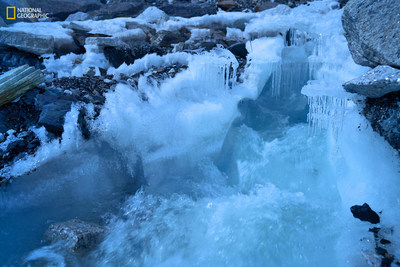 |
Research provides new insight on mountain glacier–derived water resource systems, impacting up to 1.9 billion people globally
WASHINGTON, Dec. 10, 2019 /PRNewswire/ -- Scientists from around the world have assessed the planet's 78 mountain glacier–based water systems and, for the first time, ranked them in order of their importance to adjacent lowland communities, and evaluated their vulnerability to future environmental and socioeconomic changes. These systems, known as mountain water towers, store and transport water via glaciers, snow packs, lakes and streams, thereby supplying invaluable water resources to 1.9 billion people globally—roughly a quarter of the world's population.

The research, published in the prestigious scientific journal Nature, provides evidence that global water towers are at risk, in many cases critically, due to the threats of climate change, growing populations, mismanagement of water resources, and other geopolitical factors. Further, the authors conclude that it is essential to develop international, mountain-specific conservation and climate change adaptation policies and strategies to safeguard both ecosystems and people downstream.
Globally, the most relied-upon mountain system is the Indus water tower in Asia, according to their research. The Indus water tower—made up of vast areas of the Himalayan mountain range and covering portions of Afghanistan, China, India and Pakistan—is also one of the most vulnerable. High-ranking water tower systems on other continents are the southern Andes, the Rocky Mountains and the European Alps.
To determine the importance of these 78 water towers, researchers analyzed the various factors that determine how reliant downstream communities are upon the supplies of water from these systems. They also assessed the vulnerability of water resources, as well as the people and ecosystems that depend on them, based on predictions of future climate and socioeconomic changes.
Of the 78 global water towers identified, the following are the five most relied-upon systems by continent:
The study, which was authored by 32 scientists from around the world, was led by Prof. Walter Immerzeel and Dr. Arthur Lutz of Utrecht University, longtime researchers of water and climate change in high mountain Asia.
"What is unique about our study is that we have assessed the water towers' importance, not only by looking at how much water they store and provide, but also how much mountain water is needed downstream and how vulnerable these systems and communities are to a number of likely changes in the next few decades," said Immerzeel. Lutz added, "By assessing all glacial water towers on Earth, we identified the key basins that should be on top of regional and global political agendas."
This research was supported by National Geographic and Rolex as part of their Perpetual Planet partnership, which aims to shine a light on the challenges facing the Earth's critical life-support systems, support science and exploration of these systems, and empower leaders around the world to develop solutions to protect the planet.
"Mountains are iconic and sacred places around the world, but the critical role they play in sustaining life on Earth is not well understood," said Jonathan Baillie, executive vice president and chief scientist at the National Geographic Society. "This research will help decision-makers, on global and local levels, prioritize where action should be taken to protect mountain systems, the resources they provide, and the people who depend on them."
To learn more, visit natgeo.com/PerpetualPlanet.
Photo - https://mma.prnewswire.com/media/1041075/National_Geographic_Society_Khumbu_Glacier.jpg
Logo - https://mma.prnewswire.com/media/1041076/National_Geographic_Society_Rolex_Logo.jpg